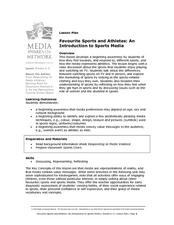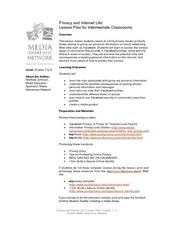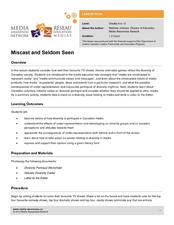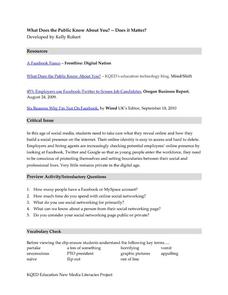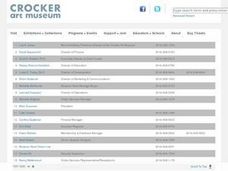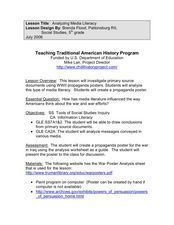Curated OER
Counteracting Media Stereotyping
Discuss media stereotypes with your emerging consumers. They view a television program to identify gender bias. After discussing the clip as a class, each learner writes a story showing more equitable roles. Or consider having them...
PBS
Technology: Conveniences and Consequences
It's a delicate balance—using technology to improve our lives while still protecting the environment, and ourselves, from the hazards of technology use. Class members examine statistics about the increase in media use, complete a survey...
PBS
Interviewing: The Art of Asking Questions
Interviewing skills are important, even outside of a news reporter's desk or employer's office. Take your class through the process of interviewing people they don't know with a set of case studies featuring journalists and various...
Curated OER
Favorite Sports and Athletes: an Introduction to Sports Media
Even young children watch sports and like team logos and products. It's never too early to think critically about what's onscreen. This exercise develops awareness that media communicate values (i.e. who participates in sports and who...
Curated OER
Discrimination and Media: Focus on Mental Health
Students explore discrimination by the media. In this media awareness lesson plan, students examine stigmas concerning mental illnesses as they are portrayed in the media.
Newseum
The Fundamentals of News
A short video introduces middle schoolers to different media-related news terms. Viewers then complete a worksheet and discuss the differences between news and journalism, between facts and opinions.
Overcoming Obstacles
Good Citizenship
An individual's background and experiences affect their worldview and interaction. In this lesson, scholars draw a pair of glasses with pictures of experiences they've been through, relate the responsibility to social media and the...
Facing History and Ourselves
Free Press Makes Democracy Work
A unit study of the importance of a free press in a democracy begins with class members listening to a podcast featuring two journalists, one from a United States public radio station and one from Capetown, South Africa. The...
Media Smarts
Defining Popular Culture
What part does media play in creating, defining, and perpetuating popular culture? High schoolers chart their encounters with fads, trends, and icons and reflect on the media's influence on popular culture.
iCivics
Propaganda: What’s the Message?
As class members progress through eight fully prepared learning stations, they will identify how bias is present in persuasive media, as well as differentiate among types of propaganda techniques like bandwagon propaganda and the use of...
Media Education Lab
The Ethics of Propaganda
What are the short and long-term consequences for consumers and producers of modern media propaganda? Class members ponder this essential question as their unit study of ethics of propaganda concludes. After examining two case studies,...
Constitutional Rights Foundation
Understanding Fake News
Fake or fact? Learners must decide while looking at two published "news" stories. A reading about why fake news exists and a checklist on how to evaluate sources rounds out the activity.
Facing History and Ourselves
The Power of Images
One picture but a thousand stories. As a part of a case study of how the death of Michael Brown was reported by professional news sources and on social media class members examine the reactions of various groups to a photograph taken by...
Curated OER
How Media Shapes Perception
Young scholars explain the impact that the media may have in shaping their intellectual and emotional responses to current events. They examine broadcast and Web-based news sites to find subtexts through the use of language, audio, and...
Curated OER
How Media Shapes Perception
Learners analyze how media shapes their perception of events. In this media lesson, students research the home pages of assigned web sites to determine how media influences how they feel about tragic event. They look at head lines about...
Curated OER
Real Life Or Broken Mirror? Examining Media Representations of Teenagers
Learners analyze representation of teenagers in the news and other media, discuss importance of media literacy in interpreting media portrayals of reality, and discuss and write about accuracy, or lack thereof, of media images of young...
Curated OER
Darfur: Violence and the Media
Learners read an article on Darfur prior to class, discuss the conflict in Darfur, visit a series of websites, and complete a worksheet evaluating the reporting and sources used. They view films on genocide to decide if the Darfur...
Media Smarts
Gender Messages in Alcohol Advertising
Make your students critical consumers of media, and foster an awareness of how culture is reflected and shaped by media. This resource covers how alcohol advertising presents and promotes gender stereotypes. After a discussion on...
Curated OER
Privacy and Online Life: Protect Yourself
Help your class protect privacy, security, and their online profiles with this examination of social media, especially Facebook, and who can see what about each of us. Resource contains useful links for learners to conduct their own...
Curated OER
Mapping the Mediasphere
Learners compare/contrast the media messages they see in two different communities in their city. They list the elements of art and the principles of design in the photographs they have taken in those two different communities. They...
Curated OER
Miscast and Seldom Seen
Consider how well students' favorite TV shows, movies and video games reflect the diversity of society. The lesson introduces your class to several media literacy concepts, such as how media conveys values and messages, as well as the...
Curated OER
What Does the Public Know About You? --Does it Matter?
Young people today have to be very careful with how they present themselves online. Show them the possible impact of their online activity and what employers might see when performing a basic search. The lesson provides a video clip...
Curated OER
When Art Conveys Political and Social Conflict
Twelfth graders consider art as a medium to convey information and opinions on social conflict and issues. They analyze images from the Crocker Art Museum, discuss their effectiveness in raising awareness of an issue, and create a...
Curated OER
Analyzing Media Literacy
Fifth graders define propaganda, evaluate World War II propaganda posters to analyze media literacy, complete War Poster Analysis worksheet, and create and share their own propaganda posters containing subject matter pertaining to war in...





